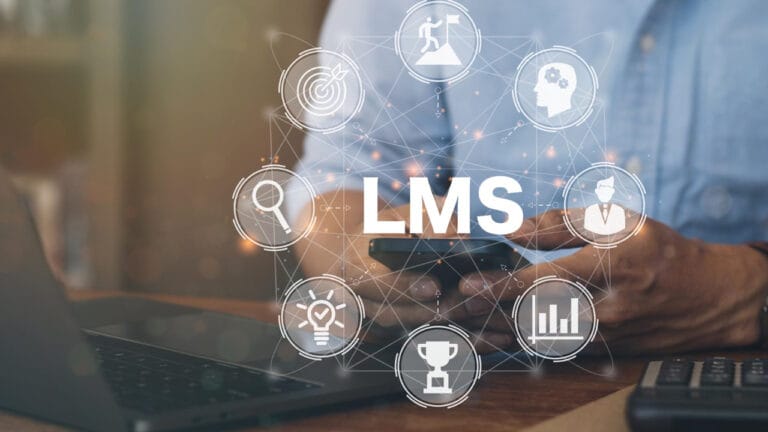In today’s fast-paced digital landscape, Learning Management Systems (LMS) have become indispensable for modern education and corporate training. They offer a centralized platform to deliver online courses, manage learning materials, and track progress. However, while the global corporate LMS market is booming with an expected growth rate of 23%, implementing these systems isn’t without its hurdles.
As you embark on integrating an LMS into your organization, you’ll likely face several challenges that can impede user engagement and the system’s overall effectiveness. From technical complexities to ensuring data privacy and maintaining user motivation, navigating these obstacles is crucial for maximizing your LMS’s potential. Understanding these common issues will empower you to develop strategies that enhance the learning experience.
This article delves into the top challenges organizations encounter when managing an LMS and provides practical solutions to overcome them, ensuring your training programs are as effective as possible.
Understanding LMS Implementation Challenges
Navigating the landscape of Learning Management System (LMS) implementation requires recognizing and addressing specific challenges. Technical hurdles often arise, with complex systems overwhelming users. Simplifying interfaces can enhance user experience and encourage engagement. Data privacy is another significant concern; ensuring compliance with regulations like GDPR safeguards sensitive information.
User motivation presents a challenge when learners perceive the system as cumbersome or irrelevant. Employing internal marketing campaigns raises awareness of LMS benefits and fosters enthusiasm. Consider offering incentives for course completion to boost participation rates.
Integration with existing systems poses difficulties but enables seamless data flow. Careful planning mitigates disruption during this transition phase. Budget constraints frequently impact implementation; allocating resources effectively ensures project success without compromising quality.
Stakeholder involvement remains crucial throughout the process, aligning objectives with organizational goals enhances long-term outcomes. By proactively tackling these obstacles, you optimize your LMS’s potential, creating a robust educational environment that supports mission-critical training initiatives.
User Adoption and Engagement
Overcoming user adoption challenges is vital for successful LMS implementation. Enhancing engagement strategies ensures learners benefit fully from the platform.
1. Addressing Resistance to Change
Resistance often stems from unfamiliarity with new technology. To mitigate this, communicate the benefits clearly and involve key stakeholders early in the process. Highlight how the LMS aligns with organizational goals and individual growth opportunities. Consider using testimonials or case studies demonstrating positive outcomes from similar implementations.
2. Effective Onboarding Strategies (Internal Marketing)
Structured onboarding eases the transition for both tech-savvy users and those less comfortable with digital tools. Develop training sessions focusing on core features, supplemented by easily accessible resources like guides or video tutorials. Encourage interaction through forums where users share experiences or troubleshoot issues collectively, fostering a community-driven learning environment that boosts confidence and participation rates.
Technical Integration and Compatibility
Integrating an LMS with existing systems often presents compatibility challenges. Addressing these effectively ensures a smoother implementation process.
1. Seamless System Integration
Standardized technologies and data formats help reduce compatibility issues during system integration. Leveraging APIs can simplify communication between systems by providing a standard method for interaction. Conduct performance testing to identify potential issues before they affect operations, ensuring that your LMS integrates smoothly with other platforms.
2. Managing Technical Glitches
Technical glitches can disrupt learning activities if not managed promptly. Implement data security measures to protect sensitive information throughout the integration process. Providing training for delivery experts ensures that any specialized knowledge required for troubleshooting is available, preventing minor technical problems from escalating into major disruptions.
Content Creation and Management
Managing content within an LMS involves several challenges that can impact the effectiveness of your training programs. Addressing these challenges ensures learners receive up-to-date, relevant information.
1. Ensuring High-Quality Content
High-quality content is critical for engaging learners and meeting educational objectives. This requires curating materials from reputable sources and aligning them with learning goals. Consistently review content to ensure clarity, accuracy, and relevance. Consider using a diverse range of formats like videos, quizzes, and interactive modules to cater to different learning styles.
2. Keeping Content Updated
With rapidly changing industry standards, maintaining current course material is vital. Version tracking in many LMS platforms helps manage updates efficiently by ensuring users access the latest resources. Regularly update your content library to reflect new trends and skills; nearly half of today’s workforce skills may become outdated in just two years according to recent studies. This proactive approach minimizes confusion from outdated information and maximizes learner competency.
Data Security and Privacy Compliance

Data security and privacy compliance are critical when implementing a Learning Management System (LMS). Ensuring user information remains confidential protects your organization from potential legal issues.
1. Implementing Robust Security Measures
Implement robust security measures to safeguard user data. Use encryption to protect sensitive information both in transit and at rest. Secure logins, such as multi-factor authentication, offer an added layer of protection against unauthorized access. Regular audits help identify vulnerabilities, ensuring your LMS meets industry standards for data protection.
2. Navigating Privacy Laws
Navigating privacy laws requires diligent adherence to regulations like the General Data Protection Regulation (GDPR). Establish clear data retention policies and obtain explicit user consent before collecting personal data. Provide transparent privacy policies outlining practices, user rights, and how you handle data. Engage legal experts to ensure compliance with regional and international requirements, reducing risks associated with non-compliance.
Time and Resource Management
Managing time and resources effectively is crucial for successful LMS implementation. Addressing these challenges enhances the overall learning experience.
1. Efficient Role Delegation
Efficient role delegation involves assigning tasks to appropriate team members, ensuring optimal use of skills. Involve trainers, content creators (e.g., video producers), and technical support early in the process to streamline workflows. Clear communication channels reduce duplication of efforts, minimizing delays.
2. Strategic Resource Allocation
Strategic resource allocation focuses on aligning resources with organizational goals. Implement a centralized system for planning and task prioritization to improve visibility across projects. Automate repetitive tasks using LMS features like content templates to free up time for high-quality material creation. This approach optimizes trainer and creator input, enhancing training outcomes.
Measuring Progress and Reporting
Accurate measurement of progress and reporting is vital for effective LMS implementation. By gathering data on key metrics, you can make informed decisions to enhance training programs.
1. Tracking User Engagement
Monitoring user engagement helps in understanding how learners interact with the content. Use built-in analytics tools to track metrics like login frequency, time spent on courses, and participation in discussions. For example, if some courses show low completion rates, consider redesigning or promoting these courses differently. Set triggers for specific actions such as course completions or quiz scores to receive real-time alerts about learner milestones.
2. Enhancing Reporting Capabilities
Customizable reports enable you to tailor insights specific to your organizational needs. By integrating third-party reporting tools or implementing custom solutions, generate tailored reports supporting business objectives. Intelligent AI features can pull preconfigured reports instantly, saving time in data analysis. Providing training on data extraction techniques ensures administrators effectively utilize these tools for insightful report generation.
Cost Management and Scalability
Managing costs effectively and planning for scalability are crucial to successful LMS implementation. Careful budget allocation ensures resources aren’t overstretched, while preparing for future growth maintains system relevance.
1. Budgeting for LMS Implementation
Implementing an LMS involves various cost components like software licensing, hosting, maintenance, and support. Begin by identifying all potential expenses to create a comprehensive budget plan. Allocate funds strategically across these areas to avoid compromising on essential features or services due to unexpected costs. Consider adaptable pricing models that can scale with usage patterns or user numbers as the organization grows.
2. Planning for Future Growth
Scalability is vital for accommodating increased demand without degrading performance. Opt for cloud-based solutions which offer flexible storage options and processing power adjustments based on user activity levels. Evaluate current infrastructure capabilities against projected needs over time; this foresight helps prevent potential bottlenecks during expansion phases when user traffic spikes occur unexpectedly within your learning platform environment.
Frequently Asked Questions
1. What are the key challenges in implementing a Learning Management System (LMS)?
Implementing an LMS involves challenges such as technical issues, data privacy concerns, and user motivation. Organizations often face difficulties with system compatibility and integration with existing infrastructure. Additional hurdles include managing budget constraints, ensuring stakeholder involvement, and maintaining updated content for effective learning outcomes.
2. How can organizations address data privacy concerns in LMS implementation?
To tackle data privacy concerns, organizations should implement robust security measures like encryption and multi-factor authentication. Regular audits can help identify vulnerabilities. Compliance with regulations like GDPR is crucial; establishing clear data retention policies and obtaining user consent are essential steps to ensure adherence to privacy laws.
3. What strategies can improve user motivation in using LMS?
Enhancing user motivation requires internal marketing campaigns and incentives for course completion. Clear communication of benefits and involving stakeholders early on can help overcome resistance to change. Additionally, offering structured training sessions and accessible resources aids in smooth onboarding.
4. Why is content management important for successful LMS implementation?
Effective content management ensures high-quality materials aligned with learning goals, which enhances training programs’ success. Regular reviews for accuracy and relevance keep the content up-to-date while using diverse formats caters to different learning styles. Version tracking helps manage updates efficiently.
5. How do technical integration issues affect LMS implementation?
Technical integration issues may cause compatibility problems during system setup, affecting overall functionality. Using standardized technologies and APIs can reduce these challenges. Conducting performance testing early helps identify potential glitches, ensuring smooth operation without disrupting learning activities.
6. What role does stakeholder involvement play in LMS implementation?
Stakeholder involvement is critical to aligning objectives with organizational goals during LMS implementation. Engaging key stakeholders ensures their input shapes the process effectively, fostering support throughout development phases and increasing chances of successful adoption across the organization.
7. How important is measuring progress within an LMS framework?
Measuring progress through accurate data collection on key metrics allows organizations to enhance training programs effectively. Monitoring engagement via analytics tools provides insights into login frequency or course participation rates while customizable reporting capabilities align reports with business objectives for informed decision-making.
Final Thought
Navigating the complexities of LMS implementation can be daunting but addressing these challenges head-on will set your organization up for success. By focusing on user-friendly interfaces robust data security and strategic resource management you can create an engaging learning environment that aligns with your organization’s goals. Prioritizing quality content and leveraging analytics tools ensures not only effective training outcomes but also sustained growth and adaptability in a rapidly evolving digital landscape. Taking a proactive approach to budget planning scalability and stakeholder involvement will maximize your LMS’s potential supporting mission-critical training initiatives with confidence.


